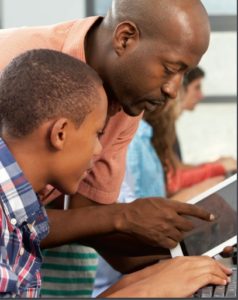Building School Communities that Prepare Youth to Thrive as 21st Century Citizens
By Amanda J. Lester
Preparing young people to succeed not only in college and career, but also in civic life, is a heightened priority. As a globalized economy, rapidly changing information technologies, and shifting social values find their way into daily life in local contexts, young people will need to develop the skills necessary to become multidimensional citizens in an increasingly complex democratic society.
To succeed in career, college, and civic life, research shows that students need to engage in educational experiences that enable them to become well-rounded and proficient in critical thinking, communication, collaboration, and creativity. These findings are reinforced by research in the areas of Deeper Learning and Positive Youth Development which emphasize the need to support and guide youth from diverse backgrounds to develop the knowledge, skills, habits, and social skills necessary to succeed as citizens in a complex world.
While the latest NYKids study investigating college and career readiness factors selected schools based on graduation outcomes, findings pointed to a number of things educators in odds-beating schools do to prepare young people to engage in civic society. Some of the strategies adopted that promote the skills students need to succeed in 21st century life, include: (1) setting expectations for youth as community citizens; (2) promoting opportunities for youth to engage in critical, yet responsible, discourse; and (3) utilizing democratic school governance.
Setting Expectations for Youth as Community Citizens
Educators in odds-beating schools often expressed that youth need to be able to display multiple skills and abilities that extend beyond academics, both inside and outside the school and through opportunities to support each other. At Freeport High School, peer mentoring was particularly important for a large population of newly arrived immigrant students.
“A lot of my students, they’re new to the country and will be completely lost. It’s cute to see how my 12th graders are helping out the 9th graders and they talk to them, like ‘oh, I used to feel that way, I used to be like this, and this is what I did, this is how I got better at this.’ They take the role of a leader.”-Freeport school social worker.
Students in the school were also encouraged to pursue social activism. In one example, students planned a demonstration to demand nationwide action on school safety. District and school leaders guided students in the planning and executing the event. As the superintendent noted, “They’re great kids. They don’t hesitate to speak up. We wanted this to be their thing, so my advice to the principal was to let the students lead.”
Promoting Opportunities for Youth to Engage in Critical, Yet Responsible Discourse
 When considering proficiencies needed to navigate as a 21st century citizen, educators in odds-beating schools, such as Maple Grove Junior-Senior High School, identified the complexity involved with being an informed and engaged citizen in the “information age.”
When considering proficiencies needed to navigate as a 21st century citizen, educators in odds-beating schools, such as Maple Grove Junior-Senior High School, identified the complexity involved with being an informed and engaged citizen in the “information age.”
“My work with seniors is crucial because the standards have to do with being an effective, and informed, and engaged citizen. When you look at the state of politics it underscores how important it is for our students to have knowledge of both points of view of issues, respect for each other’s point of view, and to have their point of view be based in knowledge rather than bias or anger. I think that is the most important thing that any of us provide here.”-Maple Grove educator.
In another example from Alfred-Almond Junior-Senior High, engaging in responsible discourse also applied to online communication. Educators viewed it as their responsibility to help students navigate technology use, including proper conduct and evaluating content through “cyber citizenship”.
“[Cyber Citizenship] is being a good citizen online. How do you speak online? How do you connect online? Who do you connect with online? Who don’t you connect with online? And what sorts of things are appropriate for a student to do online? And then, of course, you teach them what different sites do and how they’re meaningful.”-Alfred-Almond school leader
Utilizing Democratic School Governance
Educators at multiple odds-beating schools applied a distributed approach to governance that gave all citizens in the school community voice and choice. For a few odds-beating schools, this democratic approach could be seen in how the school handled behavior issues.
“In 2008, [we had] 500 suspensions of 550 children in the high school,” said the Malverne superintendent, “We set our sights on really bringing that back to square one and starting over.”
To turn things around at this high school, the district shifted responsibility for discipline to more actively involve educators and students, and students were supported in developing a vision of their dream for high school. This helped to motivate students to police their own behavior in accordance with the goals they set for themselves, emphasizing the importance of being a good citizen while engaging students in community-based problem-solving to mitigate behavior issues.
It’s About More than Just Graduating
With a focus on preparing youth for post-secondary education and careers, it is notable that educators in secondary schools identified as “beating the odds” by graduating diverse youth at higher than expected rates also used strategies to prepare youth to be active and engaged citizens.
This perspective was summed up by a staff member at Port Chester Senior High School: “Our goal [as guidance counselors] is to make sure that every student can be a productive citizen, and they have to tell us their plan. They can’t just get a diploma and walk out the door.”
Learn More About How Odds-Beaters Support Students to Become 21st Century Citizens
To learn more about how odds-beating schools identified in the NYKids Career and College Readiness study applied strategies to prepare youth to thrive as 21st century citizens, visit the research resources link on the NYKids website to read the cross-case report, related case studies, and other resources developed based on lessons learned from odds-beating schools.


